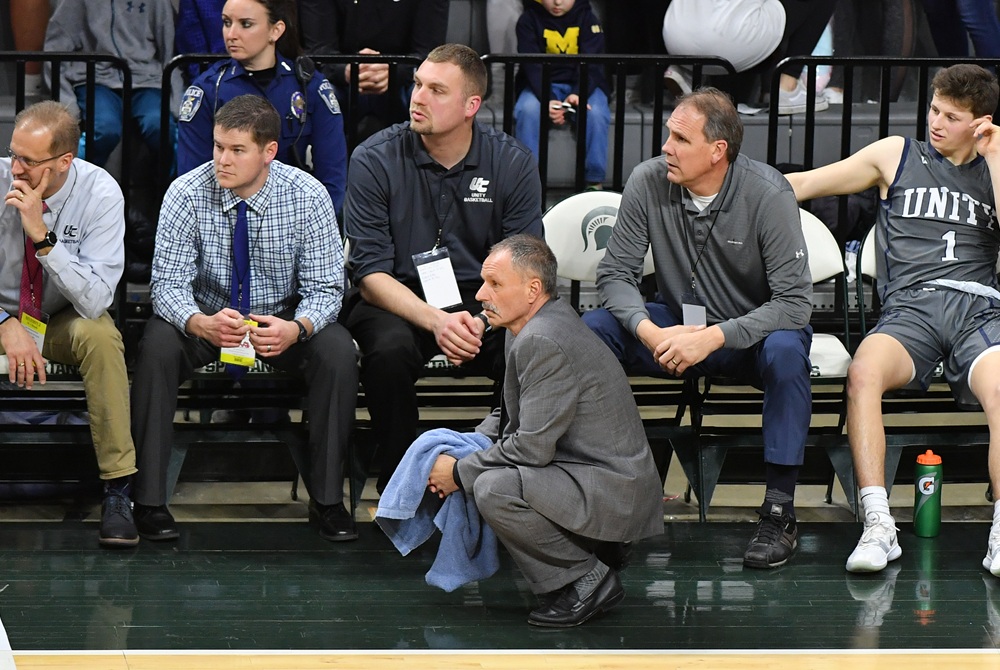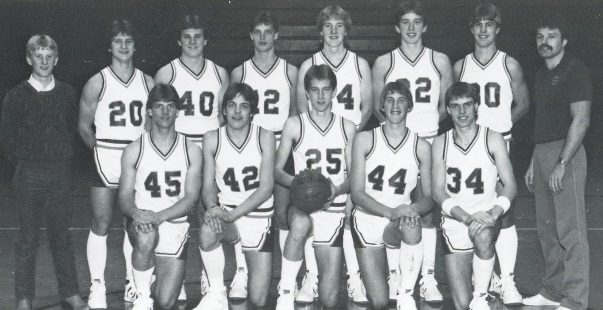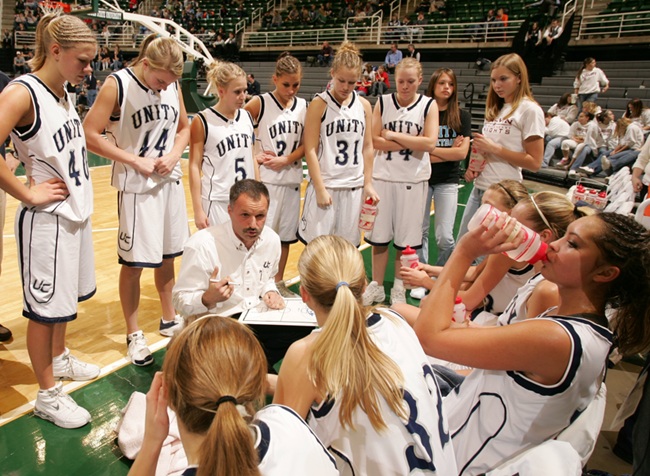
Regulation with Roots
December 3, 2015
By Jack Roberts
MHSAA Executive Director
The following is an excerpt from “History, Rationale and Application of the Essential Regulations of High School Athletics in Michigan.”
Throughout the years, schools of this and every other state have identified problems relating to school transfers.
There is recruitment of athletes and undue influence. There is school shopping by families for athletic reasons. There is jumping by students from one school to another for athletic reasons because they couldn't get along with a coach or saw a greater opportunity to play at another school or to win a championship there. There is the bumping of students off a team or out of a starting lineup by incoming transfers, which often outrages local residents. There is the concentration of talent on one team by athletic-motivated transfers. There is friction between schools as one becomes the traditional choice for students who specialize in a particular sport. There is imbalance in competition as a result. And there is always the concern that the athletic-motivated transfer simply puts athletics above academics, which is inappropriate in educational athletics.
All states have developed rules to address the problems related to school transfers. In some states it is called a transfer rule and in other states a residency rule, because linking school attendance to residence is one of the most effective tools for controlling eligibility of transfers. None of the state high school association rules is identical, but all have the intention of preventing recruiting, school shopping and jumping, student bumping, friction, imbalance and overemphasis, as well as the intention of promoting fairness in athletic competition and the perspective that students must go to school first for an education and only secondarily to participate in interscholastic athletics.
The transfer/residency rule is a legally and historically tested but still imperfect tool to control athletic-motivated transfers and other abuses. It is a net which catches some students it should not, and misses some students that should not be eligible. This is why all state high school associations have procedures to review individual cases and grant exceptions; and why all state high school associations have procedures to investigate allegations and to penalize violations where they are confirmed.
Over the years, state high school associations have considered four options to handle transfers. The first two options are the easiest courses: either (1) let schools decide themselves about transfers, as Michigan once did, but this leads to inconsistent applications and few states now subscribe to such an approach; or (2) make no exceptions at all, rendering all transfer students ineligible for a period of time, but this becomes patently unfair for some students and no state high school association subscribes to that extreme, although it would be easy to administer.
The third option – the ideal approach perhaps – would be to investigate the motivation of every transfer and allow quicker eligibility or subvarsity eligibility to those which are not motivated by athletics, but this is very time consuming if not impossible to administer. No state high school association has sufficient staff and money to consider every detail of every transfer.
This is why a fourth option has been most popular with most state high school associations. This is a middle ground which stipulates a basic rule, some exceptions (15 exceptions in Michigan), and procedures to consider and grant waivers (a primary role of the MHSAA Executive Committee).
It is certain that the MHSAA transfer rule is imperfect. However, whatever few imperfections exist are remedied through a process by which member school administrators may make application to the MHSAA Executive Committee to waive the rule if, in the committee's opinion, the rule fails to serve any purpose for which it is intended or in its application creates an undue hardship on the student. In a typical year, the Executive Committee will receive approximately 250 requests to waive the transfer regulation, approving approximately 60 percent of those requests.
The committee brings to its considerations the following rationale, most recently reviewed and reaffirmed on Aug. 5, 2015:
- The rule tends to insure equality of competition in that each school plays students who have been in that school and established their eligibility in that school.
- The rule tends to prevent students from “jumping” from one school to another.
- The rule prevents the “bumping” of students who have previously gained eligibility in a school system by persons coming from outside the school system.
- The rule tends to prevent interscholastic athletic recruiting.
- The rule tends to prevent or discourage dominance of one sport at one school with a successful program, i.e., the concentration of excellent baseball players at one school to the detriment of surrounding schools through transfers and to the detriment of the natural school population and ability mix.
- The rule tends to create and maintain stability in that age group, i.e., it promotes team stability and team work expectation fulfillment.
- The rule is designed to discourage parents from “school-shopping” for athletic purposes.
- The rule is consistent with educational philosophy of going to school for academics first and athletics second.
- It eliminates family financial status from becoming a factor on eligibility, thus making a uniform rule for all students across the state of Michigan (i.e., tuition and millage considerations).
- It tends to encourage competition between nonpublic and public schools, rather than discourage that competition.
- It tends to reduce friction or threat of students changing schools because of problems they may have created or because of their misconduct, etc.
Following the adoption of a more standardized statewide transfer rule in 1982, there were multiple legal challenges. However, in 1986, the Michigan Court of Appeals determined that a rational basis exists for the transfer regulation and that the rule, with its exceptions, is not overbroad and is neither arbitrary nor capricious, noting that neither a fundamental right nor suspect classification is involved. Berschback v. Grosse Pointe Schools 154 Mich App 102 (1986). That decision is also noteworthy for this statement which has halted or decided subsequent legal challenges: “This Court is not the proper forum for making or reviewing decisions concerning the eligibility of transferring students in interscholastic athletics.”
There were two major changes in the MHSAA transfer regulation during the 1980s. The first, the athletic-motivated transfer rule, led to the busiest period of litigation in the MHSAA’s history. The other major change, arguably of equal impact, was implemented without any controversy.
This second subtle but substantial change occurred in 1987 when language was adopted to limit eligibility after a transfer to the non-public school closest to the student’s residence, as opposed to any non-public school in whose service area the student lived. “Service area” did not have a consistent definition and created unnecessary concern that non-public schools had the advantage of huge, undefined attendance areas, compared to public school districts at that time.
Some high school associations prescribe geographic boundaries or mileage limitations for students transferring to non-public schools. Michigan simply says it’s only the non-public school closest to the student’s residence, where eligibility may be immediate.
PHOTO: The MHSAA Transfer Regulation dates back to the early 1980s when the Association building stood on Trowbridge Road in East Lansing.

Soodsma Reaches 700 Boys Hoops Coaching Wins as Unity Launches Another Title Pursuit
By
Dean Holzwarth
Special for MHSAA.com
February 26, 2026
HUDSONVILLE – Hudsonville Unity Christian boys basketball coach Scott Soodsma has been a fixture on the sidelines for more than 40 years.
 And while he’s known as a man of faith, a fierce competitor and a coach who pours everything he has into his players, he’s most commonly known as the coach with the blue towel.
And while he’s known as a man of faith, a fierce competitor and a coach who pours everything he has into his players, he’s most commonly known as the coach with the blue towel.
“I’ve had the same blue towel for 34 years at Unity, and it’s had holes in it and been sewed up a few times,” the 66-year-old Soodsma said. “It’s been around for a long time.”
The blue towel has been with Soodsma at every game, except for the first game this season against Grandville Calvin Christian.
“I had no idea where it was,” said Soodsma, who retired from teaching last year. “I stuck it in an old diaper bag and thought I would remember that I put it in there, but I didn’t. Luckily, my wife found it. I’ve never not had it except for that first game this year.”
The comfort of having a towel with him during games started during his first season (1983-84) at James Valley Christian, located in Huron, South Dakota.
It has been a lasting presence ever since, although the colors have changed.
“I had a pink towel when I coached girls at Unity, a yellow one at James Valley, and a maroon towel at McBain Northern Michigan Christian,” he said. “I don’t know, it’s just something I started having with me and I’ve had my wife run home from games when I've already been there and forgot it.
“I've sent her back home to get it because I didn’t want to coach without it. It’s been the thing I've been known for, for a long time.”
 Soodsma had it with him when he earned his 700th career win as a boys coach in a 69-28 victory over Zeeland West on Feb. 12.
Soodsma had it with him when he earned his 700th career win as a boys coach in a 69-28 victory over Zeeland West on Feb. 12.
He currently is fifth on the list of winningest coaches in MHSAA boys basketball history with a 688-258 record coaching at Northern Michigan Christian and Unity.
“It’s really amazing, and I've been very blessed to be able to go the length I have gone,” Soodsma said. “There were times when I thought I was done and I was dumb enough to do girls for five years at the same time and I did one season when the girls and boys were together.
“I’ve had a lot of texts and calls from kids after the 700 wins went out in the public and those are things that make it all worthwhile, to hear the comments and the thank-yous for what you did and the part you played in their life. More valuable than that, wanting to be part of their journey and their faith as well has been a big deciding factor in why I've stayed in it.”
Soodsma, who has won over 800 games combined as a boys and girls coach, led McBain Northern Michigan Christian to the Class D boys title in 1987. He won the Division 2 championship at Unity in 2019.
He also coached Unity’s girls to the Class B crown in 2006.
“I still love it,” he said. “I love the kids and I love the competition, but over the years, most people don't realize it, but I have mellowed a lot and I think I’m in it for the right reasons because I enjoy the kids. I want to be a factor in their life, not only from a basketball perspective, but from a Christian perspective and a faith perspective. It means a lot more to me now at my age than when I was 35-40. It’s not about wins and losses anymore.”
Unity Christian senior Kyler Berguis said Soodsma has had a profound impact on his life.
In my three years of having him as my coach I’ve never had someone motivate me more to accomplish a goal we both love so much, and that is winning,” he said. “He’s an amazing motivator, always pushing kids to be their very best every single time he steps on the court, whether that is in practice, games or shootarounds, it doesn't matter.
“You will never not feel the energy that Coach brings to the court, and the crazy thing is he’s been doing it forever. He not only has pushed me in basketball but most importantly he pushes the players off the court in how to be a man of God.”
Past Crusaders standout Gabe Newhof, currently a senior at Division I James Madison in Virginia, said Soodsma’s compassion for his players runs deep.
 “Coach has had an incredible impact on my development as a young man,” Newhof said. “Through the mountains and valleys of my life, he has been there for me. When I suffered an awful broken leg, he came and visited me at my house to let me know he cared.
“Coach has had an incredible impact on my development as a young man,” Newhof said. “Through the mountains and valleys of my life, he has been there for me. When I suffered an awful broken leg, he came and visited me at my house to let me know he cared.
“During my successes in college he has always been a voice of encouragement. I am so glad to have had a coach like him who truly cares about me on a much deeper level than just a player.”
Soodsma has guided this year’s squad to an Ottawa-Kent Conference Black title, which included going a perfect 12-0 in league play, and a 20-3 overall record after Wednesday night’s Division 2 District Semifinal win over host Wyoming Godwin Heights.
The Crusaders’ losses were to state-ranked Rockford, Hudsonville and Freeland. Unity hopes for a deep postseason run but has been hampered recently by sickness and without a couple of its top players.
“This has been a special group,” said Soodsma, who boasts seven seniors. “The one thing we pride ourselves on at Unity is getting better as the year progresses, and I could really see the kids stepping up.
“We knew we had some good kids coming back, but I didn’t think we were playing exceptionally well in December or early January. But in the middle of the month, I started to see some kids really take some huge strides in a lot of ways. The kids have done a great job of coming together as a team, and it’s definitely shown. We’ve been playing some of the best ball we have all year.”
Soodsma has been asked frequently over the past few years when he is going to step away from coaching and retire.
He said he takes each season one at a time, but as he gets older he doesn’t want to miss out on moments with his grandkids, who are scattered through the country.
“I evaluate after every year, and I will evaluate again after this season, but this could be it,” Soodsma said. “I always like to wait till the end of the season before I make any rash decisions.
“I have family all over the United States in Seattle, Denver and South Dakota, so I really want to spend some quality time with my grandkids before they get too old."
 Dean Holzwarth has covered primarily high school sports for Grand Rapids-based WOOD-TV for five years after serving at the Grand Rapids Press and MLive for 16 years along with shorter stints at the Ionia Sentinel and WZZM. Contact him at [email protected] with story ideas for Allegan, Kent and Ottawa counties.
Dean Holzwarth has covered primarily high school sports for Grand Rapids-based WOOD-TV for five years after serving at the Grand Rapids Press and MLive for 16 years along with shorter stints at the Ionia Sentinel and WZZM. Contact him at [email protected] with story ideas for Allegan, Kent and Ottawa counties.
PHOTOS (Top) Unity Christian boys basketball coach Scott Soodsma, kneeling, confers with his staff during his team’s 2019 Division 2 Boys Semifinal win over Ludington. (Middle) Soodsma, far right, stands for a photo with his 1987 Northern Michigan Christian Class D boys basketball champion. (Below) Soodsma maps out strategy during a break in the 2006 Division 2 Girls Basketball Final. (MHSAA file photos.)

